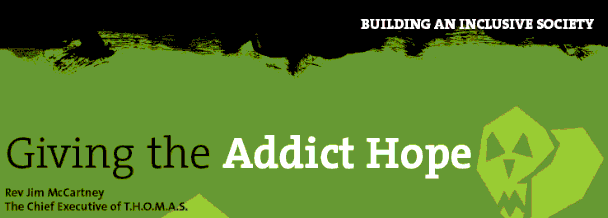
Getting it wrong is a fundamental aspect of being human.Working in the drug treatment world is a constant reminder of the fragility of our humanity. Watching broken people, deflated by guilt, full of remorse and regret is a powerful encounter of what life can do to us.We have impulses, motives and plans that have the potential to destroy our emotional and social growth. The craving desire is alive in us and can lead to maladaptive practices, exhibited in a host of behaviours that deviate from the norm. That strong desire and sense of compulsion can lead to a progressive neglect of all that is good and valuable to life. This underlying motivational component of our humanity has been the subject of considerable debate for centuries in the writings of philosophers, theologians, psychologists, sociologists and economists.We have a tendency to walk from contentment to distress, light to darkness, hope to despair. This unpredictability of what we can do or not do, is the challenge we face as pilgrims of life. God uses the day to day experiences to rebuild us. One of our residential service users recently wrote: “Your on your hands and knees; its time to admit defeat. There's nothing left to steal; there's no one else to cheat. Your heart is run on empty. Suicide has crossed your mind. Nowhere else to run; nowhere else to hide”. In our drug rehabilitation programme people have literally come to that realisation that they have nowhere else to hide. Their lives are in shreds, grated by the inhibitory forces of addiction. With bodies bruised, minds battered, dignity in tatters, they face their truth. Yet God uses this as a moment of enlightenment for them to accept what is, and embrace what can be. In the words of Lance Armstrong, the seven times winner of the Tour de France:“ Anything is possible. You can be told that you have a ninety percent chance, or a fifty percent chance, or a one percent chance, but you have to believe”. I believe everything is possible for each person who embraces our programme because they come to recognise that it is only the power of God that can transform their lives.“For nothing is impossible for God” (Luke 1.37). Jesus reminds us that everything is possible for those who believe. St Thomas Aquinas develops this view when he says “when one has faith, no explanation is necessary. To one without faith, no explanation is possible”. The covenant God has with his people becomes real to me as I witness prolific persistent offenders construct new lives. Helplessness is a human condition each one of us experiences at some stage in our lives. It may be sickness, mourning the death of a loved one, a relationship breakdown, a financial problem or host of other issues.Whatever the condition, it can have a serious effect upon the mind and the body's ability to withstand the stress. This can create in us increased irritability with ourselves and each other. In these moments when we find it difficult to concentrate on anything, it might be worth us remembering that at the close of the day,we have to physically fall asleep and into the hands of God we drift, like helpless children. This is an oasis given us by God. The covenant God has with his people through Christ, becomes more real when shattered and overwhelmed by living. These are the moments of the internalised sense of the Divine power over the human power. “God, grant me the serenity to accept the things I cannot change, the courage to change the things I can, and the wisdom to know the difference” (The addict's Prayer). |